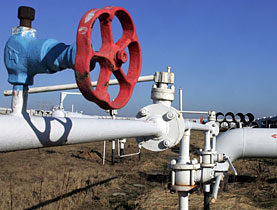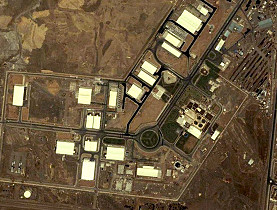Energy and human rights dominate talks in Iran

Swiss Foreign Minister Micheline Calmy-Rey has held talks in Tehran on Iran's controversial nuclear policy and on human rights.
She also attended the signing of an agreement on natural gas supply between Tehran and a private Swiss energy company, EGL. It is a key element of the country’s strategy to diversify its energy supplies.
The natural gas from Iran together with natural gas from Azerbaijan is expected to feed into a gas pipeline running from Greece via Albania to Italy, according to officials.
“It is in our national interest to support a company with a contract that helps to diversify the gas supply to Europe and indirectly to Switzerland,” says Jean-Christophe Füeg of the energy ministry.
The deal with National Iranian Gas Export Company (NIGEC) and EGL covers the delivery of 5.5 billion cubic metres of gas per year to Europe through a pipeline by 2012. The contract runs over 25 years according to EGL.
Füeg said the government was approached by EGL to offer diplomatic support in the countries along the pipeline – Italy, Albania, Greece, Turkey, Iran and Azerbaijan.
Calmy-Rey said she had been invited by Iran to the signing ceremony.
She said it was Switzerland’s strategy to diversify its source of energy supplies. “We decrease our dependence, and the dependence of Europe, on Russian gas,” she said.
Switzerland currently buys its supplies in northern Europe (Norway, Netherlands, Germany), Algeria (through France) and Russia. Consumption of gas represents about 12 per cent of Switzerland’s energy use.
Rights dialogue
During her visit, Calmy-Rey also met her counterpart Manoucher Mottaki to address human rights as well as international concerns about Iran’s nuclear programme.
She criticised the increasing use of the death penalty and corporal punishment in Iran, saying Switzerland was against both forms of punitive measures.
Both sides agreed to prepare a next round of talks as part of a five-year human rights dialogue, according to Calmy-Rey.
At a joint news conference she also said it was unacceptable for Switzerland that the Iranian leadership denied Israel – a member of the United Nations – the right to exist.
She called on Tehran to cooperate with the International Atomic Energy Agency to resolve a long-standing dispute over Iran’s nuclear programme.
For his part, Mottaki welcomed dialogue and highlighted the role of Switzerland.
The United States has led international efforts to penalise Iran for failing to allay suspicions that it is seeking nuclear weapons. Tehran says its nuclear programme is purely civilian.
Good offices
Switzerland uses its good offices to represent US interests in Iran and Iranian interests in Washington. The US and Iran broke off diplomatic relations in 1980.
Bern imposed sanctions against Iran last year over its failure to halt uranium enrichment, in line with a UN Security Council resolution.
But the role the Swiss are taking in the Iran nuclear crisis remains unclear.
Diplomats said there is a “Swiss plan”, which calls for a simultaneous suspension of Iran’s uranium enrichment programme and international sanctions. However, it has never been confirmed by the Swiss foreign ministry.
Washington has so far been critical of Swiss involvement in trying to broker a deal.
swissinfo
Persia – as Iran was then known – opened an embassy in Bern in 1917.
In 1919 Switzerland opened a consulate general in Tehran.
In 2005 there were 187 Swiss citizens living in Iran.
At the end of 2004, 3,801 Iranians were living in Switzerland.
Natural gas is imported to Switzerland by four regional companies under the umbrella of Swissgas.
About 100 mainly public companies supply the gas to households and the industry through a 16,000km network.
About 1,700 people work for the Swiss gas industry which has an annual turnover of SFr1.7 billion.
The use of natural gas in Switzerland represents about 12% of the nationwide energy consumption.

In compliance with the JTI standards
More: SWI swissinfo.ch certified by the Journalism Trust Initiative

You can find an overview of ongoing debates with our journalists here. Please join us!
If you want to start a conversation about a topic raised in this article or want to report factual errors, email us at english@swissinfo.ch.